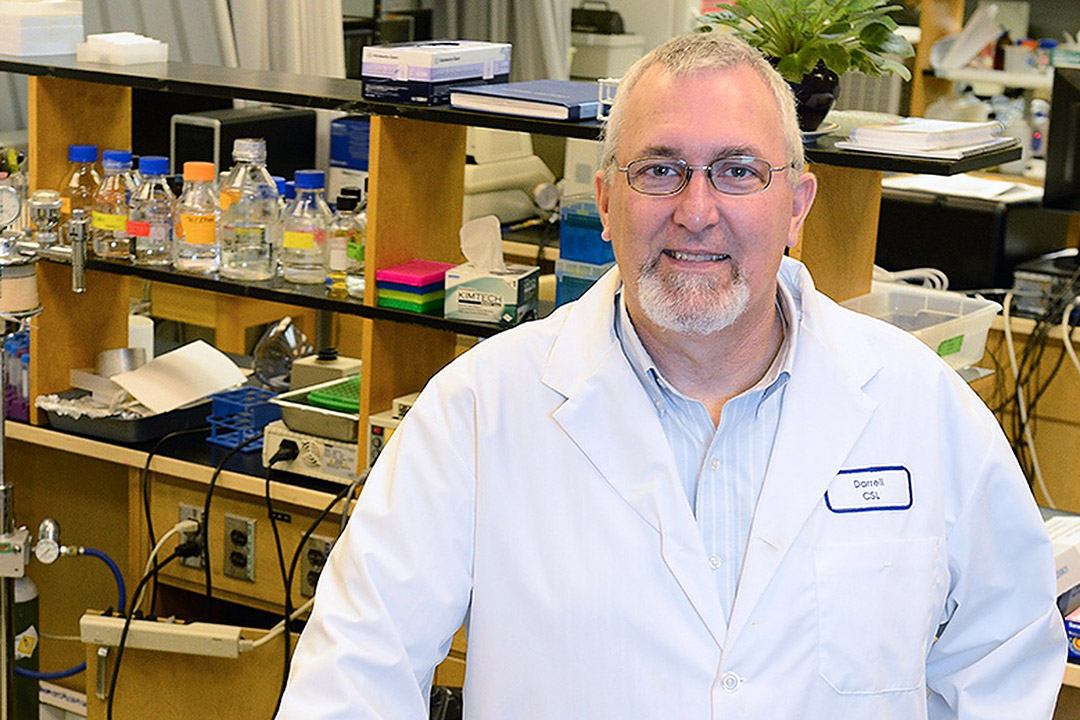
USask research team aims to predict aging-related diseases, Alzheimer’s disease
A University of Saskatchewan (USask) research team is investigating a gene variant that could be used as a blood test marker to anticipate aging diseases, such as Alzheimer’s disease (AD), diabetes and cancer.
By Kristen McEwenDr. Darrell Mousseau (PhD), a professor in the Department of Psychiatry in the College of Medicine, is leading the USask research team as they examine the gene found in DNA called presenilin 1 (PSEN1).
“We’ve found what’s called a splice variant,” Mousseau explained. “Simply put, it’s a version of the gene PSEN1 that the cell has slightly modified, so it doesn’t use the whole gene, just part of the gene.”
Mousseau is also the head of the Cell Signaling Laboratory and the Saskatchewan Chair in Alzheimer disease and related dementias. The position is co-funded by the Saskatchewan Health Research Foundation and the Alzheimer Society of Saskatchewan.
Along with colleagues Dr. Chris Eskiw (PhD), College of Agriculture and Bioresources, and Dr. Michael Wu (PhD), Western College of Veterinary Medicine, Mousseau is investigating how the PSEN1 gene variant is tied to premature aging.
“(PSEN1) is a gene we’ve all got,” Mousseau said. “It’s just at some point, the cells decided they don’t want to make the full-length gene, they want to make a shorter version.”
“(The PSEN1 gene variant) is interesting for two reasons,” he said. “It gives us an understanding of why some people age more quickly, and why they would be more prone to developing Alzheimer’s disease. It also potentially gives us a target tied in with aging.”
The PSEN1 gene variant appears to lead to cell aging and may be the reason why some individuals to start aging faster than others. The variant has also been associated with increased risk of age-related diseases such as AD, diabetes or cancer.
“Once the gene is shortened, it messes up the cellular works and affects gene expression,” Mousseau said. “It affects protein breakdown, the production of beta-amyloid, it affects a number of things in the cell, and all of these changes within the cell are incredibly reminiscent of aging.”
PSEN1 also helps make a protein peptide called beta-amyloid 42 (Aβ42), which is responsible for causing AD. Mousseau’s team released a study earlier this year on Aβ42.
By studying the PSEN1 variant, treatments could be created to slow down the aging process. In comparing brain tissue samples, the presence of the variant was found alongside Aβ42 in autopsy tissues from donors with a diagnosis of AD.
“You can see differences in blood samples in looking for this particular variant,” he said. “It means we could do a simple blood sample test and say, ‘look you’ve got this variant, you’ve got a pretty good chance you’re going to age faster than what you expect to age – and you’ve got a better chance of developing age-related diseases.”
Mousseau, Eskiw and Wu are collaborating with colleagues across the country to obtain an animal mouse model and study how the gene variant impacts the mouse’s aging, genetics, and physiology.
“If we can look at the (gene) that makes the beta-amyloid, we can see that it’s taken a different shape, so it’s not functioning the way it should be,” Mousseau said. “That’s telling us that’s something’s going to happen before the beta-amyloid is made.
“If we can detect things earlier, the more likely we are to treating patients and slowing (aging).”
The World Health Organization is spotlighting Alzheimer’s/dementia research this month, with September declared World Alzheimer’s Month and Sept. 21 World Alzheimer’s Day.
Article re-posted on .
View original article.
